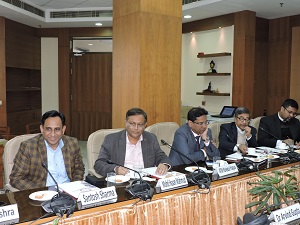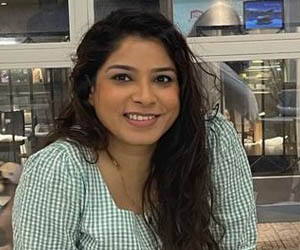The Vivekananda International Foundation organized a talk by honourable Md. Hassan Mahmud Esq. on India Bangladesh Relations, chaired by Dr Arvind Gupta, Director VIF.
Md. Hassan began by emphasizing India's role during the time of Bangladesh's independence and how the relationship between the two immediate neighbours has shaped over the period of time. He particularly emphasized the years since 2009 as the golden phase of interaction and cooperation between the two countries especially under the leadership of Prime Minister Narendra Modi and Bangladesh Prime Minister Sheikh Hasina.
Md. Hassan underlined the important historical relations shared by the two countries, but also raised concerns over how the benefits of close cooperation and interaction were not yet tapped to its fullest potential. This potential, he stressed could be tapped now, with both the countries on the path of prosperity and development. For example, he gave the example of Bangladesh buying electricity from India and India sending its goods to Ashuganj port to ensure they reach the northeastern states of India.
He outlined three main conditions to ensure further development of the two countries as well the region as a whole. First, the need to ensure greater integration, like that of the European Union so that the region as a whole could economically prosper.
The second important factor is to build up trust especially to resolves issues like terrorism. And the third, he stated, as an important pillar to initiate new ideas and visions is the need for more involved interactions among think tanks in both the countries.
His presentation was followed by Arvind Gupta reflecting on the discussion and citing examples of how there is growing interaction among the two countries and how VIF as a think tank and other think tanks in both the countries are interacting and generating new ideas as well as raising concerns so that the two countries can come closer.
Other distinguished guests also commented on the importance of India-Bangladesh relations, the pertinent issues remaining, the issues that needed immediate focus and the future prospects. The ensuing discussions included, the need for irreversible trust and need to focus on mutual benefits, for example, focusing on river management.
The need to create new channels of communication to translate the goodwill between the two governments across the people as well was brought out. The successful deployment of South Asian Satellite was one such positive development. India and Bangladesh could seek new areas of cooperation, so that the two countries could achieve their Sustainable Development Goals.
Both the neighbours have worked to maintain peace at the Borders. Cultural relations were also part of the discussion where Bangladeshi citizens participated in the cultural program of India. This area could be documented as a record for the close the interactions of people celebrating everyday events. Mukti Jodha's participations are decreasing over the period of time, for which we must make efforts to ensure participation of the next generation. The two sides should also cooperate to protect the Sundarbans.
Irreversible trust has been stated as key to address the entire gamut of concerns raised in the interaction. There is a need to consolidate and institutionalize the gains and also work with regional organizations. Emphasis was also laid to strengthen the perceptions across both the countries, for which, support of media was important where views and ideas could be exchanged freely.
The concluding remarks focused on the future expectations across both countries to enhance collaboration and cooperation to build up trust and regional development. There are aspirations for greater integration but there are barriers, for example, visa restrictions. The main speaker suggested the introduction of the border entry visas for greater integration. Security is the key pillar for countries’ trust and cooperation and in Shiekh Hasina words Bangladesh soil would not be used to disrupt the security in the neighbouring country, India and since 2009 the relationships have entered a new phase. The region needs to be self-dependent and for this, the two countries hold an important role of cooperation and collaboration.
The interaction had the presence of distinguished guests like Amb Satish Chandra, Amb. Veena Sikri, Dr. Joyeeta Bhattacharya, Shri P.K. Mishra and many others from VIF.







Post new comment